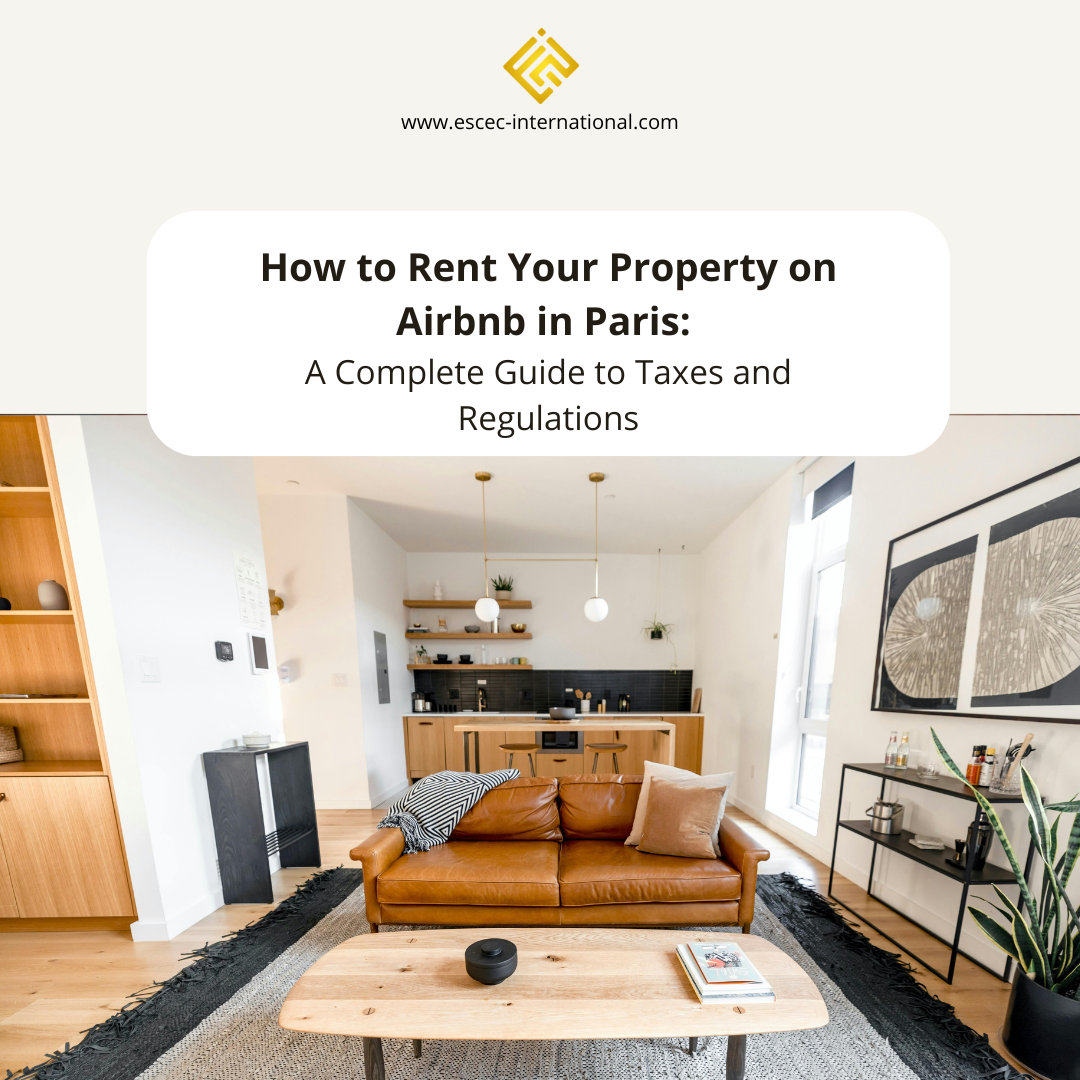How to Rent Your Property on Airbnb in Paris: A Complete Guide to Taxes and Regulations
/in Blog /by escecAirbnb Paris has become a booming market, providing homeowners with an opportunity to earn extra income by renting out their properties to millions of tourists who flock to the city every year. While it’s an exciting way to generate revenue, it’s crucial to understand the legal requirements, tax implications, and municipal regulations that come with renting your property on Airbnb in Paris. In this comprehensive guide, we’ll break down everything you need to know to ensure you’re compliant with the law and maximizing your rental income.
Renting Your Property on Airbnb in Paris: Legal Overview
If you’re considering listing your property on Airbnb in Paris, the first step is understanding whether your property is classified as a primary residence or a secondary home. This distinction significantly affects how you can rent out your space and the rules you must follow.
Primary Residence
A primary residence is the property where you live for at least 8 months of the year. If you plan to rent out your primary residence on Airbnb, you’re allowed to do so for up to 120 days per year. Exceeding this limit could result in fines or legal action from local authorities.
Secondary Residence
If your property is classified as a secondary residence—meaning you live there for less than four months a year—you have more flexibility. However, you will still need to register the property with your local municipality, and in some cases, you may be required to obtain additional permits depending on the area of Paris where your property is located.

Tax Obligations for Airbnb Hosts in Paris
One of the most important aspects of renting your property on Airbnb in Paris is understanding and complying with your tax obligations. Hosts in Paris must pay both income tax and the taxe de séjour (tourist tax). Here’s what you need to know:
Income Tax on Airbnb Earnings
Your Airbnb rental income is subject to income tax in France, and it must be reported annually. The way your tax is calculated depends on the tax regime you fall under:
- Micro-BIC Regime: If you earn less than €32,900 annually from renting your property, you qualify for the Micro-BIC regime, which provides a 50% flat-rate deduction on your earnings. For properties like gîtes or guest rooms, this threshold increases to €80,300, and the deduction rises to 71%.
- Real Expense Deduction (RRS): If you earn more than €32,900 but less than €763,000 annually, you may opt for the real expense regime, which allows you to deduct real expenses like repairs, maintenance, and management fees. However, this option involves more administrative work.
Tax Exemption Threshold
If you earn less than €305 per year from renting your property, you are exempt from paying income tax on your Airbnb income.
Tourist Tax (Taxe de Séjour)
Since July 1, 2018, Airbnb has automatically collected the tourist tax on behalf of hosts in cities like Paris. The taxe de séjour is determined by local municipalities and varies depending on the type of property and its classification (e.g., hotels, furnished rentals). Airbnb adds this tax to the total booking price paid by the guest, and it is remitted to the municipality twice a year.
For non-classified furnished properties, the tourist tax is typically set between 1% and 5% of the price per night, per person. This tax also includes additional regional taxes like the Grand Paris surcharge, which adds an extra 15% in certain areas of Paris.
Airbnb Tax Compliance: What Hosts Need to Know
As an Airbnb host in Paris, you are responsible for ensuring that your property is properly registered, and your earnings are declared for tax purposes. Here are the essential steps to ensure compliance:
- Register Your Property Since 2017, it has been mandatory for hosts in Paris to register their properties with the local authorities, even if they are only renting them out for a short time. Upon registration, you will receive a registration number that must be included in your Airbnb listing. Failure to register can result in hefty fines of up to €50,000.
- Declare Your Income Even though Airbnb automatically collects and remits the tourist tax, you are still responsible for declaring your rental income in your annual tax return. Make sure you keep accurate records of your earnings, as these will need to be included in your income tax filings.
- Understand Social Contributions If you are a permanent resident of France, your Airbnb earnings are also subject to social contributions. If you make more than €23,000 annually from renting out a furnished property, you may be required to join the Sécurité Sociale Indépendants, the social security scheme for self-employed individuals. Alternatively, you may qualify for the general social security scheme, which can offer lower contribution rates depending on your earnings.
The Importance of Insurance for Airbnb Rentals
Renting out your property on Airbnb comes with certain risks, such as property damage or liability issues. To protect yourself and your guests, it’s crucial to have adequate insurance in place. While Airbnb offers Host Guarantee Insurance, it’s often advisable to invest in a more comprehensive insurance policy tailored specifically to short-term rentals in France. This will ensure that you’re fully covered for any potential issues that may arise during a guest’s stay.
Maximizing Your Airbnb Rental in Paris: Best Practices
To ensure your Airbnb rental in Paris is successful and compliant, follow these best practices:
- Register Your Property: Always ensure your property is registered with the municipality and that you include your registration number in your Airbnb listing.
- Accurate Tax Declarations: Keep detailed records of your Airbnb earnings and expenses and ensure you declare your income to the French tax authorities.
- Stay Within Rental Limits: If you are renting out your primary residence, don’t exceed the 120-day limit to avoid penalties.
- Invest in Insurance: Make sure your property is properly insured for short-term rentals to avoid financial losses in case of any accidents or damages.
Conclusion: Renting Your Property on Airbnb in Paris
Renting out your property on Airbnb in Paris can be a lucrative opportunity, but it comes with various legal and tax obligations that need to be carefully managed. From understanding income tax regulations to ensuring tourist tax compliance, hosts must navigate a complex set of rules. With the right preparation and by following the necessary steps, you can ensure a smooth and profitable experience as an Airbnb host in one of the world’s most visited cities.
For more personalized assistance, ESCEC International can help you manage your Airbnb rental in Paris by providing expert advice on tax compliance, property registration, and maximizing your rental income. Contact us today to make sure your Airbnb venture in Paris is both profitable and fully compliant with French regulations.

